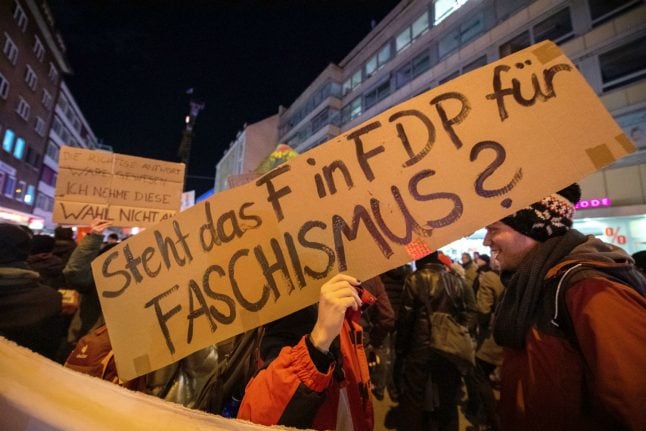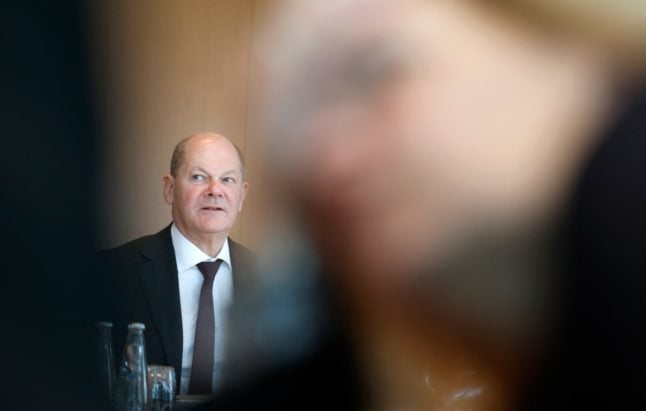On Wednesday all political hell broke loose in Germany after Thomas Kemmerich, from the economically liberal Free Democratic Party (FDP), won a vote to become premier in the central eastern state of Thuringia despite his party having just five seats in the local parliament.
He stepped down on Thursday after an outcry across Germany. Here's how the drama played out.
What’s happened?
What became apparent was that the far-right Alternative for Germany (AfD) had backed Kemmerich in the vote, effectively pushing incumbent Bodo Ramelow of the Left party (die Linke) out of office.
Kemmerich scored 45 votes, beating Ramelow, who has been state premier in Thuringia since 2014, by one vote.
People from across the political spectrum have accused both the FDP and the conservative Christian Democrats (CDU) of tacit cooperation with the AfD, and there are now calls for new elections.
Chancellor Merkel on Thursday said it was “unforgivable” that a politician in Thuringia allowed himself to be elected state premier with help from MPs from the far-right AfD, calling for the vote to take place again.
What happened in Thuringia “is unforgivable and that's why the result must be reversed,” Merkel said at a press conference in South Africa.
She added that it was “a bad day for democracy”.
The Frankfurter Rundschau ran with a picture of Thomas Kemmerich shaking hands with the AfD's Björn Höcke with the headline: “The fascist and his tool”.
‘The fascist and his tool’ today’s @fr on #Kemmerich election pic.twitter.com/k0zlS6uRif
— Lars Scholtyssyk (@lars_scho) February 6, 2020
Bild ran the same picture with the headline: “The handshake of shame.”
Unsere Seite 1 zu einem Tag, als Faschisten einen FDP-Mann zum Ministerpräsidenten gewählt haben. @BILD pic.twitter.com/eX5DKfO2Fa
— Paul Ronzheimer (@ronzheimer) February 5, 2020
On Wednesday night protests took place in several German cities, including Erfurt, Hamburg, Cologne, Leipzig, Düsseldorf, Berlin and Munich.
READ ALSO: 'First time in history': Far-right AfD backing for regional politician shocks Germany
 A protester holds a 'never again' poster in Munich. Photo: DPA
A protester holds a 'never again' poster in Munich. Photo: DPA
Around a thousand people gathered in front of the Thuringian State Chancellery on Wednesday night, forming a human chain. Some chanted: “Who betrayed us? Free Democrats!” and “Not my state premier!”
In Berlin, more than a thousand demonstrators gathered in front of the party headquarters of the FDP and CDU.
People shared clips on social media of the protests.
Stimmung.#Thüringen #b0502 #noFDP #berlinFDP #berlin #fdp #kemmerich #dammbruch pic.twitter.com/TbN0GC4pzM
— majka (@majkaczapski) February 5, 2020
Why is it so controversial?
The regional election in Thuringia last October saw the Left come out on top as the most popular party with 31 percent of the vote.
The party was unable to hold onto a majority coalition with the centre-left Social Democrats (SPD) and the Greens but carried on with a minority coalition.
Still, Ramelow, a popular local politician, was widely expected to win the vote and continue as state premier.
The FDP scraped into the Thuringia state parliament, winning just five seats so it is by all accounts absurd that they should have a leader in place.
READ ALSO: What does the far-right AfD's success in Thuringia mean for Germany?
 The AfD's Björn Höcke congratulating the FDP's Thomas Kemmerich. Photo: DPA
The AfD's Björn Höcke congratulating the FDP's Thomas Kemmerich. Photo: DPA
The candidate for the AfD, which surged into second place in last year’s regional elections with 23.4 percent, received zero votes, indicating the party's politicians aligned as a bloc behind Kemmerich.
While the vote was secret, the liberal candidate must also have enjoyed support from lawmakers belonging to Merkel's conservative CDU, as well as his FDP colleagues.
Adding to the fire is the fact that AfD's leader there, Höcke, is one of the party's most radical figures, heading a movement within the party known as the “Wing”.
He has in the past called for a “180 degree turn” in Germany's culture of remembrance for the Holocaust and other crimes of the Nazis, which form a central pillar of the country's post-World War II political life.
Last September, a court ruled that Höcke could legally be termed a fascist as the description “rests on verifiable fact”.
FDP boss Christian Lindner said the vote had not been agreed beforehand with the AfD. He said he was surprised by the outcome, and that the AfD’s vote for his candidate had been “purely tactical”.
What’s the reaction?
It’s been described as a “political earthquake” with implications at all levels.
Chancellor Angela Merkel's CDU immediately called for fresh regional elections as a way out of the crisis, a call echoed by other mainstream parties, reported AFP.
The result sparked widespread outrage, with Norbert Walter-Borjans, co-leader of Merkel's junior coalition partner the Social Democratic Party (SPD), calling for a “clear position” distancing Merkel's conservatives from the AfD.
“What has happened in Thuringia is not just a matter for Thuringia” but for federal politics too, he told broadcaster ZDF.
“This is a bad day for Thuringia, a bad day for Germany,” CDU president Annegret Kramp-Karrenbauer said.
 The Left's Bodo Ramelow on Wednesday. Photo: DPA
The Left's Bodo Ramelow on Wednesday. Photo: DPA
She called for new elections in the state and blasted regional politicians for breaching the party's policy of no cooperation with the AfD.
“New elections would be the best thing for Thuringia,” the CDU's secretary general Paul Ziemiak added.
Members of the two government parties, CDU and he SPD, organized a crisis meeting in Berlin on Saturday to discuss the issue.
“The republic is in danger,” said Katja Kipping, a leader of the far-left Linke party.
“How far have we come that the FDP allows a state premier Kemmerich to be voted in with votes from the fascist Höcke and the AfD?”, said The Left's Bernd Riexinger. “Breaking this taboo will have far-reaching consequences.”
READ ALSO: AfD surges to second place in Thuringia state election
Addressing the local parliament in Erfurt, Kemmerich sought to play down concerns by insisting he would stick to a pre-election pledge not to work with the AfD.
“You have in me a bitter opponent of anything that even hints at radicalism, from the right or left, or fascism,” he said, but he faced jeers from MPs and shouts of “Hypocrite!” and “Charlatan!”.
AfD co-leader Jörg Meuthen told the Frankfurter Allgemeine daily the vote showed there was “less distance” between the CDU, FDP and AfD than other parties, showing the movement was part of a “middle class” majority.
It would be “understandable” if the AfD demanded ministerial jobs in Kemmerich's government, he added.



 Please whitelist us to continue reading.
Please whitelist us to continue reading.
Member comments